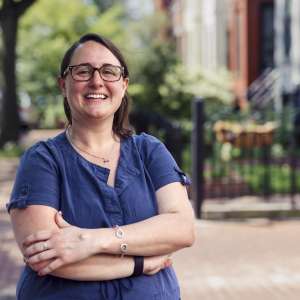Keene State and the NH Primary
As the home of the first-in-the-nation primary (in its 100th year in 2016), New Hampshire and Keene State College offer students rare access to candidates and campaigns, as well as multiple media outlets and prognosticating pundits who descend on the Granite State every four years.
Before the Electoral College plays its role in the political process, colleges like Keene State do their civic duty by offering candidates a stage to discuss their platform—and members of the college and city communities a forum to debate the issues.
Keene State has been a must-stop on the NH campaign primary trail for many of the presidential candidates. In collaboration with the American Democracy Project, KSC has hosted eight candidates, including democrats Bernie Sanders and Hillary Clinton and republicans Dr. Ben Carson and Carly Fiorina. Courtney Janvrin, a sophomore English/communications major from Seabrook, NH, has enjoyed attending the rallies on campus. “I think it’s nice how Keene State asked them to come right to us,” said Janvrin in a video interview posted on the school newspaper the Equinox web page. “It has really swayed my opinions a lot and made me realize how important it is for me to get out and vote. One vote can make a difference.”
Keene State students have also ventured off-campus to see candidates. In early February, Giselle Alexandria Snow, a nursing student from New London, CT, introduced Sanders to a crowd that filled the Colonial Theatre in Keene.
“It’s certainly a lot of fun to observe the primary here in NH because of all the activity and all the candidates coming through,” said Bill Bendix, an assistant professor of political science at Keene State. “It’s also great for teaching because students are more excited about politics generally. You have students who are following the news, the headlines, watching the polls, so there’s more energy in the classroom.”
Why Keene?
Recently on campus, Dr. Andrew E. Smith, the Director of the UNH Survey Center and Associate Professor of Practice in the Department of Political Science at UNH and co-author of The First Primary: New Hampshire’s Outsize Role in the Presidential Elections, says there are several factors that make Keene State an appealing stop for candidates on the primary campaign circuit.
One of the most prominent is location. “Cheshire County is the biggest of the smaller counties in the region, and the College serves as a good central venue for candidates,” he said. “Using students as a backdrop also looks good in your TV commercials—you want them to represent the future and not the status quo.”
Those students not only serve as window-dressing for snappy soundbites on the six o’clock news, but play a role a key role in the campaign, providing candidates with a potentially large and cheap workforce willing to roll up their sleeves and perform many of the grass roots tasks that are essential for a campaign’s success. “College kids are a great source of volunteer labor,” said Smith. “They will work for beer and pizza and long hours, which would kill older people.”
Julie McClain, press secretary for Hillary for New Hampshire, says she’s been impressed with enthusiasm of Keene State students. “From packing Hillary Clinton’s town hall meeting in the Mabel Brown room on campus to holding student organizing meetings and hosting regular phone banks, Keene State students have been front and center since Hillary Clinton kicked off her campaign in Keene last April. We have seen energy and excitement from students who believe that, not only will Hillary take on the issues they care about—like making college affordable, achieving equal pay for women, and creating new jobs, but she has the experience and toughness to get things done.”
Getting involved
Coming right to students’ doorstep on campus, the primary also serves as a learning lab for KSC teachers and students. Many professors work the primary into their curriculum, discussing issues, strategy and media coverage. Former KSC Professor Chuck Weed, who spent 14 years in the NH state legislature and is currently serving on Bernie Sanders’s steering committee, says he encouraged his students to talk about the issues. “Instead of a scholarly professor, I was an activist professor—so always talked about issues,” he said. “I wanted students to be involved and recognize how important it was. That gets enhanced when the outside environment like the primary encourages it.”
Many KSC students take it a step further, getting actively involved in the primary. Recently named the vice-president of KSC Democrats, Eric Labieniec, a sophomore political science/economics major from Berlin, CT, and a worker on the Bernie Sanders campaign, has been busy dorm-storming and getting people out to vote. Meanwhile Kevin Boyle, a junior sociology major from Stratham, NH, is a campus team leader for the Hilary Clinton campaign, organizing events and helping the campaign maintain a presence at the College and the surrounding area.
Sometimes, college experiences can have a lasting impact. Kerry Marsh ’03, serves as the NH state director of Fiorina Super PAC. Meanwhile, Dave Wenhold ’90, who interned with a US senator while at Keene State, is a lobbyist in Washington, DC. Christina Ladam ’09 has worked for a nonprofit that focuses on political and economic inequality. Will Pearson ’14 has been elected to be a delegate for Hillary Clinton at the national convention this summer, and current student Colleen Willis, a sophomore political science major from Keene, was a pledged NH delegate to the national convention for Martin O’Malley before he dropped out of the race.
“I think students have the opportunity to really get involved in a significant national event at Keene State and I encourage them to do that,” said Jim Rousmaniere Jr., who served as the news editor for the Keene Sentinel for 34 years and covered eight primaries, on a recent visit to campus.“ They have the opportunity to grill the candidates up close which you can’t find if you’re a student in other states.”
First-time Voters
More importantly, college students are not only workers, but in many cases first-time voters too. “All the studies that I’ve read suggest that once students vote for the first time, it sets a pattern for the rest of their lives and their participation is a commitment to engagement,” said Weed.
Those numbers become more impactful when you take into account that students have the constitutional right to register and vote in the place they consider to be “home”—whether that’s your parents’ house, your apartment, or your dorm room. “College is an excellent place to have that first-time experience because all types of forces are present urging people to vote,” said Michael Welsh, a professor of political science at Keene State.
“People with more education tend to be more frequent voters,” he added. “They got this greater amount of knowledge but also live in a setting that encourages them to take that first vote.”
One of the most galvanizing candidates to appear on campus, Sanders has resonated with young Keene State voters with many of plans, including his proposal to offer free tuition for students at all public colleges and universities in the United States. “Sanders is new on the scene and he is definitely not the status quo in the Democratic Party,” said Smith. “College age students tend to go in that direction. He’s like your grandfather who is so square he’s cool—he’s got vinyl records instead of DVDs.”
Regardless of which side of Appian Way you stand on the candidates and the issues, students like Skylar Sinde, a sophomore political science major, said you can’t make a difference about your future if you don’t vote. “We’re the future generation of this country and will have a responsibility to not only, teach our younger generation but also have the ability to change this country ourselves,” he said. “So I think it’s really important you get out and vote—not matter who you vote for—as long as you find the person who is going to share your views.”





